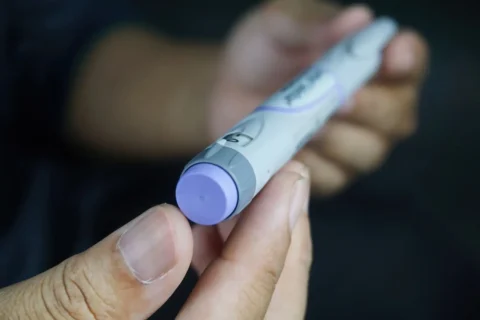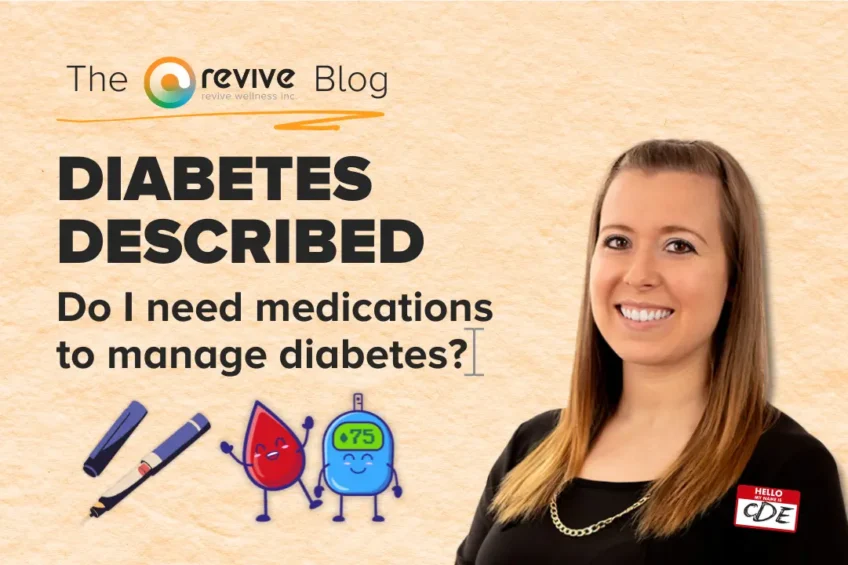Diabetes Described Series: Do I need medications to manage diabetes?
- Kaylee Turner
- July 8, 2025
One of the most common questions asked is: “Will I need to take medication to manage diabetes?” The short answer? Maybe. The long answer? Diabetes management is unique to each individual, the type of diabetes, and the approach evolves over time.
Diabetes is a chronic, progressive condition, meaning that what works today may not be enough in the future. As your body changes, so do your blood glucose management needs, and sometimes, medications become a necessary tool in your care plan (1).
Understanding When Medications Are Needed
If you’ve been diagnosed with type 1 diabetes, your body does not produce enough insulin on its own, so rapid and basal insulin therapy is started immediately💉. This is essential for maintaining blood glucose levels (2).

If you’ve been diagnosed with prediabetes or type 2 diabetes, medication may—or may not—be introduced at some point in your journey. Many individuals may aim to manage diabetes through nutrition, movement, stress management, and sleep quality—all of which play a critical role. However, because diabetes is progressive, lifestyle strategies alone may not be enough. The reality is that diabetes does progress over time and what worked for us 10 years ago may not work in the future (1). We may need to change care plans, and that could involve starting medications.
When that happens, introducing medication isn’t a failure—it’s simply adding another tool to help keep healthy. If your doctor thinks that you need a medication added, please don’t consider this discouraging. You could be doing everything right—eating well, exercising, getting quality sleep, and managing stress—and still find that your blood glucose levels need additional support. This is not a reflection of what you’re doing “wrong” but rather an opportunity to personalize your care, and manage diabetes effectively.
Medication as a Supportive Tool 💊
At Revive Wellness, we encourage a balanced, individualized approach. Medications are one of many tools that can help you thrive while managing diabetes—not something to fear or resist. If your doctor recommends a medication, it’s because they want to help you maintain optimal health for the long run.
For a list of diabetes medications, visit Diabetes Canada – Diabetes Canada Medication Sheets (3).
❓Have Questions? We’re Here to Help!
The question of whether you need medications to manage diabetes does not have a simple answer. If you’re currently on diabetes medication and want to understand how it works—or if you’re wondering whether medication might be right for you—book a discovery call with Kaylee today!
As a Registered Dietitian and Certified Diabetes Educator, Kaylee is passionate about helping individuals feel empowered in their diabetes care. Whether you’re newly diagnosed or adjusting your treatment plan, she’s here to support you every step of the way.
Click the link here to book a discovery call with her today!
Continue reading:
👉 Blog: Diabetes Described: What is A1c?
👉 Blog: Diabetes Described Series: 5 Common myths of diabetes care
About the Author

Kaylee Turner
When I was younger, I knew I wanted a career where I could help people and make a difference in their lives. We live in a world where diabetes and chronic diseases are so common, and the problem is that many people don’t know where to find reliable information. I take pride in keeping up to date on research, attending conferences around diabetes, and providing the best evidence-based care possible. I have specialized in diabetes full-time since 2020, and I completed my Certified Diabetes Educator (CDE) certification in 2023.
References
Lipsombe L, Booth G, Butalia S, Dasgupta K, et al. Diabetes Canada 2018 Clinical Practice Guidelines for the Prevention and Management of Diabetes in Canada: Pharmacologic Glycemic Management of Type 2 Diabetes in Adults. Can J Diabetes 2018;42(Suppl 1):S88-S103. Retrieved from https://guidelines.diabetes.ca/cpg/chapter13
Angela McGibbon MD, PhD, FRCPC, FACP, Lenley Adams MD, FRCPC, FACP, Karen Ingersoll RN, CDE, Tina Kader MD, FRCPC, Barna Tugwell MD, FRCPC. Diabetes Canada 2018 Clinical Practice Guidelines for the Prevention and Management of Diabetes in Canada: Glycemic Management in Adults With Type 1 Diabetes. Can J Diabetes 42 (2018) S80–S87. Retrieved from https://www.sciencedirect.com/science/article/abs/pii/S1499267117308225
Diabetes Canada: Clinical practice guidelines. Diabetes Canada | Clinical Practice Guidelines. Self Management Education: Medications Sheets. Retrieved June 5, 2024, from. https://guidelines.diabetes.ca/reduce-complications/medication-sheets
Diabetes Educator Calgary: Complete Diabetes Medications Table. Retrieved June 5, 2024, from: https://diabeteseducatorscalgary.ca/medications/complete-medication-table.html

